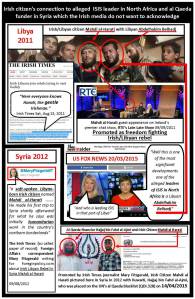The Dublin-Doha Nexus: Ireland’s Key Role in the Muslim Brotherhood’s Global Jihad
EUROPE, 3 Aug 2015
Maidhc Ó Cathail, The Passionate Attachment – TRANSCEND Media Service
July 30, 2015 – In a July 25 Irish Independent analysis piece entitled “Ibrahim’s two-year detention says much about Egypt today,” Mary Fitzgerald chastises the Irish government for not doing more to secure the release of Ibrahim Halawa, an Irish citizen arrested by the Egyptian authorities for his part in the August 17, 2013 Ramses Square protests against the army’s ousting of the Muslim Brotherhood’s Mohammed Morsi.
 Fitzgerald’s sympathies are clear.
Fitzgerald’s sympathies are clear.
“The military coup of 2013 has ushered in a regime that is dramatically more repressive than that of Hosni Mubarak, the dictator forced to step down in the face of mass protests in the heady days of 2011,” she opines. “Hundreds of people have been swept up and detained for being in the wrong place at the wrong time as the regime of president Abdel Fattah al-Sisi appears determined to snuff out the Muslim Brotherhood, the largest and oldest opposition movement in Egypt.”
Back in those “heady days of 2011” the then Irish Times foreign affairs correspondent was unequivocally enthusiastic about the revolutionary wave roiling the region. In an interview she gave to her current employer entitled “Listening to Libya’s stories of freedom,” Fitzgerald waxed lyrical about her first hand experiences in the North African country that has subsequently imploded into chaos and violence from which nobody—not even the prime minister—is safe.
“The story of Libya’s uprising is hard to beat, especially for those of us who were there right from the beginning – I arrived in Libya ten days after the first protests began on February 15. Several friends who covered the fall of the Berlin Wall and all that followed in 1989 say Libya – or the Arab Spring more generally – is the only story that has grabbed them in the same way,” she told the Irish Independent.
“The Libyan uprising was a genuine people’s revolution involving Libyans from all walks of life – young, old, male, female, rich and poor – and their strength and courage in the face of Gaddafi’s brutality was hugely inspiring and very moving.”
Revolutionary chickens come home to roost
Four years on, three Irish citizens were among the 38 holidaymakers brutally murdered on a beach in neighbouring Tunisia last month by a gunman believed to have been trained in the now anarchic Libya—quite possibly by some of those same strong and courageous revolutionaries promoted by Fitzgerald.
“The murder of three Irish citizens at a tourist resort in north Africa has brought Islamic terrorism much closer to home,” Cormac O’Keeffe observed in the Irish Examiner.
“Until now we have looked on in shock, and revulsion, at terror attacks targeting other Europeans, either across the Middle East and North Africa, or on European soil. However, with the slaughter on the beaches of Tunisia of Lorna Carty, and Laurence and Martina Hayes, this is a landmark moment for this country.”
O’Keeffe quoted Martina’s brother Billy Kelly, who told the media, “We feel bitter. Irish people have nothing to do with these terrorists. The people who did this are evil rats.”
The Irish Examiner report appears to be merely stating the obvious. However, the Tunisia beach massacre was by no means Ireland’s first brush with Islamist terrorism. And while the bereaved Mr. Kelly sincerely believes that the Irish have nothing to do with these evildoers, there are some in the country who have quite a lot to do with them.
Irish jihadis
A CNN study published in September 2014 surprisingly found that Ireland is second only to Finland among countries with the greatest percentage of Muslims who have gone to fight in Syria. Although the number of fighters is still small—25 to 30 as of last September—the 0.07 percent of Ireland’s 43,000 Muslim population that have joined the global jihad against President Bashar al-Assad means that “there are four times as many Irish Muslims as British Muslims fighting in Syria, proportionately speaking.”
While most people in Ireland remain blissfully unaware of these disturbing developments, a keen observer of Western-backed terrorism against Libya and Syria has sought to raise awareness of the little-known Irish role in global jihadism. In a Facebook post, Al Lonergan connected the dots obscured by Ireland’s “paper of record” and other mainstream media.
“The following image provides information regarding an Irish citizen’s connection to an alleged leader of ISIS in North Africa and a terror funder in Syria,” the Irish activist noted. “However it is unlikely that the Irish media will want to mention this fact as they promoted this guy as a ‘freedom fighter’ while he was serving the NATO agenda in destroying Libya and Syria, but the chickens are coming home to roost.”
 Not only has the “soft-spoken” Libyan-born Irish citizen Mahdi al-Harati served the NATO agenda in Libya and Syria, “the gentle Irishman” was inadvertently outed by an Irish tabloid in 2011 as an asset of American intelligence.
Not only has the “soft-spoken” Libyan-born Irish citizen Mahdi al-Harati served the NATO agenda in Libya and Syria, “the gentle Irishman” was inadvertently outed by an Irish tabloid in 2011 as an asset of American intelligence.
“A gang of rogue Irish travellers is in the frame for the bizarre robbery of €200,000 in cash donated by US spies to Libyan freedom fighters,” began the Sunday World report. “In an astonishing tale worthy of the John le Carre [sic] novel Tinker, Tailor, Soldier, Spy, the cash that was destined for rebels fighting Colonel Gaddafi’s forces was stolen from a hot press in a Dublin house. Gardai [sic] are now investigating the extraordinary robbery which is being blamed on a traveller gang from the Limerick town of Rathkeale. An Irish freedom fighter who helped bring down Gaddafi’s hated regime in Libya has claimed that €200,000 cash stolen from his Dublin home was given to him by an American intelligence agency.”
There was no mention of Harati’s ties to U.S. intelligence, however, in Mary Fitzgerald’s August 2011 piece for the “democracy-promoting” Foreign Policy magazine. In “The Syrian Rebels’ Libyan Weapon,” the jihadists’ leading publicist in Irish media wrote:
“The Tripoli Brigade was one of the first rebel units into the Libyan capital in August 2011. Its fighters, who included many Libyan expatriates, had received training from Qatari special forces in Nalut, a town in Libya’s western mountains. After the fall of Tripoli, during which he participated in the battle for Muammar al-Qaddafi’s Bab al-Aziziya compound, Harati was appointed deputy head of the Tripoli Military Council (TMC), serving under Abdel Hakim Belhaj, former leader of the now-defunct Libyan Islamic Fighting Group. Last autumn Harati stepped down as commander of the brigade and as TMC deputy. He made his first trip to Syria shortly afterward for what he says was initially humanitarian work in the country’s northern borderlands.”
The fact that Libyan-born Irish jihadis were trained by Qatari special forces is far from the only link that connects Doha to Dublin. As Fitzgerald observes in her Irish Independent piece, Ibrahim Halawa at one point shared a cell with Al Jazeera journalist Peter Greste; and just before his arrest, Halawa’s sisters were interviewed by the Qatari-owned TV channel infamous for its cheerleading for the so-called “Arab Spring.”
Moreover, as Fitzgerald delicately puts it, “Ibrahim’s case is perhaps complicated by the fact his father is the secretary of the European Council for Fatwa and Research (ECFR), a group of scholars that issues religious opinions on practical matters specific to Muslims in Europe. It is an offshoot of the Brussels-based Federation of Islamic Organisations in Europe (FIOE), an umbrella group of various branches and affiliates of the Muslim Brotherhood in Europe.”
Perhaps, indeed!
In 2011, Sheikh Hussein Halawa hosted the controversial ECFR head, the Qatar-based Sheikh Yusuf al-Qaradawi, who is also from Egypt and a close friend, for a five-day conference in one of the Muslim Brotherhood’s main European centres at the Islamic Cultural Centre of Ireland in Clonskeagh, Dublin. In that same “heady” year, Qaradawi used his Al Jazeera platform to issue fatwas against Gaddafi in Libya and Assad in Syria. (Following the 2013 ouster of the Muslim Brotherhood government, he also issued a call for jihad in Egypt.) Although he is banned from the U.S. and the U.K. for his extremist views, the Brotherhood’s influential spiritual leader perhaps not surprisingly expressed his support for the NATO-imposed “no fly zone” over Libya.
Transit hub for “gentle” jihadis
In January, the Sunday Independent reported that Ireland is now being used as a “transit hub for Jihadis heading for Iraq and Syria.”
“A small number of Irish-based Muslim extremists have been playing a key role in providing logistical and financial support to international terror groups, especially Islamic State (IS),” the well-known Irish crime reporter Paul Williams revealed. “The central group, consisting of about 12 radicals, are suspected of harbouring jihadi fighters from Britain and mainland Europe and supplying them with fake documentation, including false passports.”
On the face of it, the Irish government seems duly concerned about the growing Islamist threat and appears to be taking steps to counter it. In the past year, a Counter Terrorism International (CTI) unit has been established in the Garda Crime and Security section to specifically target the Islamic terror support groups here; while Justice Minister Frances Fitzgerald told a parliamentary committee that the Gardaí were aware that about 30 suspected jihadis had travelled from Ireland to take part in various conflicts since the start of the “Arab Spring.”
One suspects, however, that Minister Fitzgerald’s globetrotting namesake in the Irish media has yet to be questioned by the state’s brand new counter-terrorism unit about her work as advocate for the “gentle” Irish “freedom fighters” in the Muslim Brotherhood’s jihad against secular Arab regimes.
______________________________________
Maidhc Ó Cathail is a widely published writer and political analyst.
Go to Original – thepassionateattachment.com
DISCLAIMER: The statements, views and opinions expressed in pieces republished here are solely those of the authors and do not necessarily represent those of TMS. In accordance with title 17 U.S.C. section 107, this material is distributed without profit to those who have expressed a prior interest in receiving the included information for research and educational purposes. TMS has no affiliation whatsoever with the originator of this article nor is TMS endorsed or sponsored by the originator. “GO TO ORIGINAL” links are provided as a convenience to our readers and allow for verification of authenticity. However, as originating pages are often updated by their originating host sites, the versions posted may not match the versions our readers view when clicking the “GO TO ORIGINAL” links. This site contains copyrighted material the use of which has not always been specifically authorized by the copyright owner. We are making such material available in our efforts to advance understanding of environmental, political, human rights, economic, democracy, scientific, and social justice issues, etc. We believe this constitutes a ‘fair use’ of any such copyrighted material as provided for in section 107 of the US Copyright Law. In accordance with Title 17 U.S.C. Section 107, the material on this site is distributed without profit to those who have expressed a prior interest in receiving the included information for research and educational purposes. For more information go to: http://www.law.cornell.edu/uscode/17/107.shtml. If you wish to use copyrighted material from this site for purposes of your own that go beyond ‘fair use’, you must obtain permission from the copyright owner.